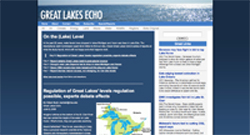Great Lakes Wiki has spun off a new project, Great Lakes Echo. The website, launched in March 2009, features the reporting of paid students and graduate assistants at the Knight Center for Environmental Journalism at Michigan State University. MSU students at the university’s Capital News Bureau in Lansing, Mich., contribute other stories.
![]() Some of the students are paid as freelancers by the Charlottesville, Virginia-based Environmental Health News service (EHN), which covers environmental health issues worldwide. “We run those stories when they are relevant to the Great Lakes region,” says Dave Poulson, associate director of the Knight Center for Environmental Journalism, noting that Echo writers also have provided EHN with stories that provide important links back to Great Lakes Echo.
Some of the students are paid as freelancers by the Charlottesville, Virginia-based Environmental Health News service (EHN), which covers environmental health issues worldwide. “We run those stories when they are relevant to the Great Lakes region,” says Dave Poulson, associate director of the Knight Center for Environmental Journalism, noting that Echo writers also have provided EHN with stories that provide important links back to Great Lakes Echo.
“We try to report at least one original story five days a week,” Poulson says, adding that Echo reporters’ work is also supplemented by links to environmental articles by outside news organizations.
A lack of community engagement with the wiki prompted Poulson and his team to switch gears and start Great Lakes Echo. “Even when we met with people and explained the [wiki] concept and how to work it, participation was lower than I had hoped for,” Poulson says, adding that technical complications might have been off-putting to potential wiki users. The last straw came when the wiki “broke” — and only one devoted contributor complained about an inability to contribute. (The problem has been fixed, Poulson reports.)
For now the wiki is “on hold but not abandoned,” Poulson says. “One idea is to allow the wiki to become a sort of definitional resource that Echo refers to. So if there is an Echo story regarding air pollution, there would be a link back to the wiki where regional air pollution problems are extensively described by wiki participants.”
 The new, cleanly designed, easy-to-navigate Echo site features a variety of story types. Some articles are “translational” – they put scientific studies into laymen’s terms. Many are about government efforts to “green” the area’s economy. The Echo also is following the exploits of a kayaker who’s paddling around each of the Great Lakes, providing monthly updates about his progress. And, reports Poulson, “stories about critters – wildlife – draw significant interest.”
The new, cleanly designed, easy-to-navigate Echo site features a variety of story types. Some articles are “translational” – they put scientific studies into laymen’s terms. Many are about government efforts to “green” the area’s economy. The Echo also is following the exploits of a kayaker who’s paddling around each of the Great Lakes, providing monthly updates about his progress. And, reports Poulson, “stories about critters – wildlife – draw significant interest.”
The new website already has received accolades. A Chicago communications company that works for public and nonprofit agencies listed the Echo among the top news sources about Great Lakes restoration. Reported the firm: “[Great Lakes Echo posts] good articles about the science and big picture implications of problems and proposed solutions.”
The Echo also was recently picked as “site of the month” by the Great Lakes Information Network: “The [Echo] provides quality reporting on environmental issues in the Great Lakes region, and offers aggregation services to allow users easy access to environmental news daily.”
The Echo staff markets the new site daily, using Twitter, Facebook, its own e-mail list of subscribers and listservs of environmental organizations, Poulson says. He also reports that during the week of May 17, 2009, the site set a daily record of 344 visits and 299 uniques. On May 26 the site more than doubled that, receiving 713 hits and 665 unique visits. “We’re not sure what’s going on, but we’re hoping it continues,” Poulson says.
Poulson and his team have contacted ProPublica about taking part in the nonprofit reporting group’s crowd-sourcing experiment to track federal stimulus spending. The Echo could follow environmental stimulus funding in the Great Lakes region, Poulson says, or it could simply encourage Great Lakes citizens to get involved in ProPublica’s effort. “ProPublica is thinking about it, but they have expressed initial enthusiasm,” he reports.
The Echo also plans to cover some of the public hearings on lake water levels scheduled around the basin this summer. “I hope that we can build an online forum for citizens who cannot attend these hearings,” Poulson says. “We hope to supplement with stories about the controversy and about the scientific studies that are now emerging regarding the causes of the fluctuations [of water levels] and the consequences of such control.”
Poulson says he is “torn” about whether to continue to work with students or to go for another funding model that would allow him to hire experienced journalists. In the fall he will renew attempts to involve other regional journalism schools in providing content.
— Hope Keller



